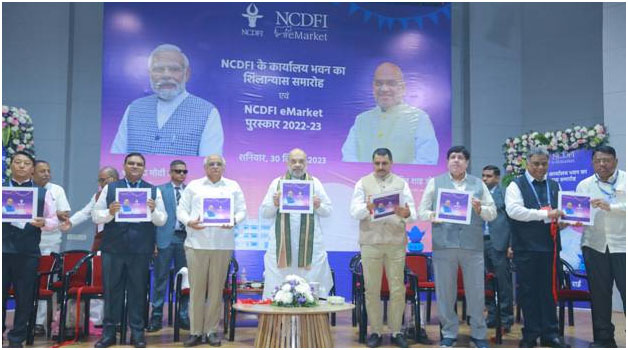- Amit Shah lays the foundation stone of the headquarters of National Cooperative Dairy Federation of India (NCDFI) Limited on Saturday and addressed the e-Market Awards 2023 ceremony
- Under the leadership of Prime Minister Narendra Modi, milk production in India has increased by about 51% in the last 8 years, which is the fastest increase in the world
- Today, most of the milk production in the country is being done through cooperative dairies, that is why today India has reached the first place in the world milk production with 24% share
- If milk is traded through the cooperative sector, it has multidimensional benefits for the society, agriculture, villages, milk producers and ultimately the country
- In Banaskantha district alone, Rs 800 crore have been deposited in farmers’ accounts so far and 193 ATMs set up, and 96 percent of farmers have got Rupay cards
When the cooperative sector does dairy business, the first to benefit are the milk producers, because they are not exploited
NE BUSINESS BUREAU
GANDHINAGAR, DEC 30
Union Home and Cooperation Minister Amit Shah on Saturday said dairy cooperatives in the country should “move 100 percent towards e-business”, and a pilot project undertaken by the district dairy cooperatives in Panchmahal and Banaskantha in Gujarat in this regard should be replicated elsewhere.
He was speaking here after virtually laying the foundation stone of the National Cooperative Dairy Federation of India’s (NCDFI) headquarters at Anand in Gujarat.
It was heartening to honour member associations promoting e-marketing in the dairy industry at the NCDFI E-Market Award 2023 ceremony in Gandhinagar today. I am confident that this initiative by NCDFI will take the cooperative dairy sector to new heights.
Also laid the… pic.twitter.com/q8kmJmeYhN
— Amit Shah (Modi Ka Parivar) (@AmitShah) December 30, 2023
In his address, Amit Shah said that the dairy and especially the cooperative dairy sector in our country has achieved multi-dimensional goals. He said that if milk trading is not done by the cooperative sector, then milk production remains limited to a middleman and the milk user. But if the cooperative sector trades milk in a cooperative manner, then many dimensions are integrated into it, because the aim is not to make profit only and it has multidimensional benefits to the society, agriculture, villages, milk producers and ultimately the country. He said that India has experienced this success story in the last 50 years.
Shah said that White Revolution started from the village ‘Vasi’ and now headquarters of NCDFI is going to be built in the same Anand district in an area of about 7000 square meters. It will be built at an expense of about Rs 32 crore and will be operated through a solar power plant. He said that the new headquarters building will be a 100 percent green building.
“I urge NCDFI members to move 100 percent towards e-business. We have begun with a small pilot project by giving Kisan Credit Cards (KCC) to each farmer in a couple of districts in Gujarat itself. Each farmer’s account is being transferred to a cooperative bank. The milk payments are being transferred into their bank accounts. If this model is implemented across the country, it will bring about a huge change and further accelerate India’s digital economy,” Shah told the gathering.
As part of the initiative, the district dairy cooperatives in Panchmahal and Banaskantha are providing Rupay cards to farmers with the help of the state cooperative bank, setting up ATMs in villages and transferring money in farmers’ accounts.
In Banaskantha district alone, Rs 800 crore have been deposited in farmers’ accounts so far and 193 ATMs set up, and 96 percent of farmers have got Rupay cards.
“The cooperative sector cannot develop unless there is cooperation between cooperatives,” Shah said.
“If we decide that the accounts of tehsil cooperative societies, farmers, businessmen and APMCs (Agriculture Produce Marketing Committees) should all be in cooperative banks, and if Amul (dairy product brand of the Gujarat Cooperative Milk Marketing Federation) takes loans from the Gujarat State Cooperative Bank, then cooperation between cooperatives will give the sector great strength,” he added.
He has requested the chairman of the Gujarat State Cooperative Bank Ajay Patel to implement the model in every district of the state by opening accounts of every farmer and dairy cooperative society in the respective district cooperative bank, Shah said.
“That way, they will not be required to take money out of their pockets but will use a Rupay card,” he said.
Farmers do not want to evade tax, but end up facilitating the same by making payments in cash, the Union minister said, adding that cash transactions encourage informal economy.
Shah also said that when cooperatives stay away from the milk business, the sector does not grow beyond milk producers, middlemen and consumers.
“When the cooperative sector is involved in the milk business, the first beneficiary is the milk producer who is saved from exploitation,” he added.
Many dignitaries, including Gujarat Chief Minister Bhupendra Patel, Gujarat Legislative Assembly Speaker Shankar Choudhary, IFFCO Chairman Dilip Sanghani, NDDB Chairman Dr Meenesh Shah and NCDFI Chairman Dr Mangal Rai were present on the occasion.









